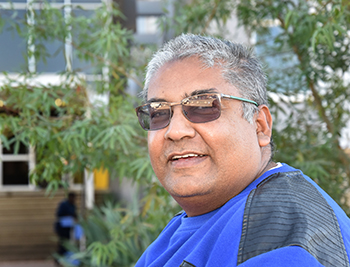Latest News Archive
Please select Category, Year, and then Month to display items
07 March 2018
Photo Supplied
 Ts’epang Sello, one of the Kovsie contenders for a medal at Friday’s Varsity athletics meeting.
Ts’epang Sello, one of the Kovsie contenders for a medal at Friday’s Varsity athletics meeting.
Ts’epang Sello, one of the Kovsie contenders
for a medal at Friday’s Varsity athletics meeting.
Photo: Supplied
The University of the Free State will hope to start developing their next Wayde van Niekerk when the first Varsity athletics meeting takes place on Friday at the Tuks Athletics Stadium in Pretoria.
The second meeting is on 23 March, also in Pretoria.
Thirteen members (five men and eight women) of the Kovsie team of 25 are still under the age of 21.
The hope for medals among the men would be on Sefako Mokhosoa (triple jump), Hendrik Maartens, and Tsebo Matsoso (both 200 m). Mokhosoa, who represented South Africa last year at the Southern Region Championships, is in red-hot form and achieved a personal best of 16.13 m at the Motheo/Xhariep meeting two weeks ago. This is currently the third best distance in the country for 2018.
Maartens would like to go one step further. In last year’s final Varsity meeting, he finished second in 20.62. Great things are expected of Matsoso, a first-year student who competed at the African Junior Championship in 2017. Last year, he was one of the top athletes at school level by winning the SA title in a time of 21.14.
Ts’epang Sello (800 m) and Elmé Smith (100 m and 200 m) will lead the charge for the women. Sello already came close to her personal best (2:09.8) this year, while Smith has also been running fast times. Her best this year was 11.88 (100 m) and 24.53 (200 m).
Tyler Beling (1 500 m) is another first-year student who is showing great potential. She obtained a fourth position at last weekend’s CAA Southern Region Cross-country Championships. Maryke Brits (100 m hurdles and long jump) is a possible medallist, despite running her first event for the year on Wednesday night.
The meeting starts at 17:15 and will be broadcast on SuperSport 5.
Prof Solomon appointed to board of flagship journal of UNECA
2016-10-06

Prof Hussein Solomon, member of the Editorial
Board of the Afro-Arab Social and Economic
Review. He is also the author of Islamic State
and the Coming Global Confrontation.
Photo: Charl Devenish
“I cannot say I worked towards it – I just did my work, and I guess someone noticed.” These are the words of Prof Hussein Solomon from the Department of Political Studies and Governance at the University of the Free State (UFS), who was recently appointed to the Editorial Board of the Afro-Arab Social and Economic Review.
On an editorial board with people he quoted
This is the flagship journal of the United Nations Economic Commission for Africa (UNECA). The mandate of the Economic Commission for Africa (ECA) is to promote the economic and social development of the states which are regarded as members of the United Nations (UN). Prof Solomon says the board consists of people that he used to quote when he was a student, and to serve alongside them is a privilege.
Book launched in Greece, Japan, and Indonesia
His book, Islamic State and the Coming Global Confrontation, was earlier published by Palgrave Macmillan in London and launched in Greece, Japan, and Indonesia in June and July 2016 respectively. It analyses the origins and organisational structure of the Islamic State (IS), ans examines its military triumphs and success in securing new recruits via social media.
Exploit of IS vulnerabilities to combat organisation
Prof Solomon says the IS makes use of the winning hearts and mind (WHAM) principle where they earn the trust of residents by providing basic services, and the only solution we have is to “exploit the Islamic State’s vulnerabilities and to highlight their atrocities.”
He mentions that a lot needs to be done to overcome the IS. It is vital to have boots on the ground and an acceptance that countries will splinter. An overarching strategy needs to be in place which allows for regional variations, good governance, and the countering of extremism.